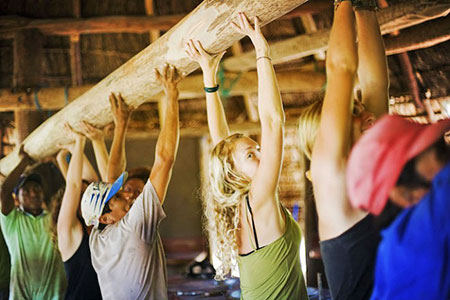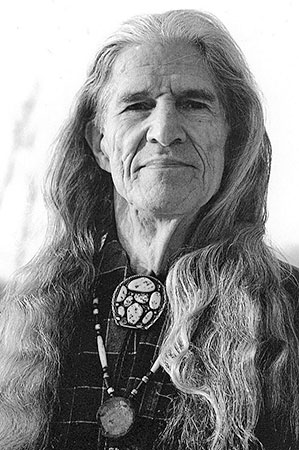|
by Manitonquat from News-Beacon Website
Lakota
Manitonquat
It seems Old Man Winter doesn't want to move on yet.
He threw some more snow on us last night, and the wind outside is pretty chilling. So it's good we have plenty of firewood and we have our stove making it warm and cozy in here now.
I burned some sweet
grass to give us a nice clean new atmosphere in the room, and I put
my prayers for opening our minds together into a pinch of tobacco
that I gave to the fire.
The word has a bad reputation these days
with so many tribes led by hereditary chieftains that in many places
are absolute autocrats of patriarchal fiefdoms that are often
abusive and brutal to women and children. That is certainly not what
I think about when I hear the word tribe.
The rest of the world is
either of mixed tribal heritage or has lost connection and knowledge
of any tribal lineage in their families. It is my experience that
most people today feel isolated and unconnected with the communities
around them and very many of them feel the longing for the kind of
closeness and mutual support that the idea of a tribe conveys to
them.
The Assonet Band of the Wampanoag, on the mainland of southeastern Massachusetts and eastern Rhode Island is autonomous and has a chief, male or female, who is appointed by the clan mother at the behest of the women of the band after they have conferred with the men.
If the chief were to do
something the women disapproved of, they would let him know, and if
he continued to defy them, they would choose another chief to
conform to the will of the people. In modern times this has not ever
happened.
The way that Black Elk, the Oglala holy man, put it,
My elders assured me that, although the instructions to live in a circle was transmitted through our traditions, it was a way for all people, not just for us. Not an "Indian way" but a "human being way".
As they instructed me to do I have been passing along this
information to others around the world for forty years now.
The energy that held circles together was mutual protection and support that developed our very human attributes of cooperation and caring. The energy, in other words, of love.
When the mutual support and caring of the circles was no longer available, the new world of strangers was frightening. Out of that fear arose individuals desperate to survive and using their strength and cunning to do so, generally by means of violence.
The chaos of population without circles was soon replaced by a different order: the order of warlords, of authority and hierarchy, held together by the threat of violence, of death or enslavement.
The
energy, in other words, of fear.
In his lifetime he had seen the transition from the circle, from the equality of all people, from the simple village life - no ownership but complete sharing and cooperation - to the imported civilization and the autocracy of bureaucracy and U.S. corporations.
We stood in a circle there in Shoshone country, our arms about each other, and there were tears flooding his eyes as he told us,
The social form of fear which gave rise to,
...as well as,
We have not created this society, but it has a hand in creating us.
In making us feel powerless, forcing us to conform, using its
wealth to isolate us, to keep us from creating a more human system
and convincing us that happiness is being able to buy a lot of
material stuff, keeping us tied to deadening jobs to pay for them,
as their acquisition depletes the earth.
They make the best of it, even if it means taking on more jobs and cutting themselves further from closeness with their children and families, from friends and elders.
There are signs now of worldwide discontent:
But the need for a more human way of life has also been moving in a more positive and creative direction.
The consideration of that and how you might use it to make a better life for yourself and a better society for everyone is the subject of these talks. This direction, which has been building for many decades, slowly over half a century, has been picking up speed because of our environmental crisis.
The term that has been adopted by many people involved is "eco-village".
Thousands of people around the world with
the understanding that "small is beautiful", are networking and
learning from each other how to create sustainable lifestyles that
will not deplete the planet's resources or harm other life forms.
But I would like to propose a
further investigation of the benefits to be gained by living the
circle way of life.
If you ask me why of course I do
not know, but I feel quite sure that the origins of inhumanity are
to be found in fear. It is fear that prompted societies to
propitiate the gods in blood, in violence and mistreatment. The
monotheistic
religions of the world have also suffered from that
affliction.
So, even as we might consider an ideal human
being upon which to model our actions, I would propose we describe
an ideal society to be a model for our community.
The faces you see are smiling with love and gleaming with tears of joy. You are here at last!
The whole
tribe is waiting to meet you and cheer you into their world. You
look to make connections and each one wants to connect with you, to
help and guide you. Your coming has brought new happiness to the
people. You have many relatives: the whole village is your family.
Human beings became human because they came together to help each other and we have evolved with helpfulness as a basic ingredient of our nature. I that way each one was equally important, each must be listened to, to be understood and appreciated.
This is why as long as the circle was unbroken the
people flourished. When we lose the circle we lose each other, we
become afraid, and we lose our humanity. And that is why we live
today in such a inhuman world.
That is
what happens in our prison circles. Simply by learning respect, by
treating each other respectfully, listening to one another, being
there to support each other, the circle members begin to heal.
He was considering the coming prospect of his release and said,
That closeness, feeling
at home with the people around us, that feeling of family-hood, is
what we all need, and now the goal for Little Wolf must be when he
gets out to find a circle or to make one and to keep getting close
and building family wherever he is.
A true tribe must provide protection and
support to every member equally. I a truly human society there can
be no discrimination against any individual regardless of age,
physical or mental capacity, sex, or sexual preference.
The child
grows with a sense of belonging, of being cared about, of having a
place and a value among his or her people.
And when we have that attitude of caring and paying good attention to them, we are constantly being confronted by the innate wisdom that we once ourselves possessed, that we brought into this world in our nature.
That wisdom which the exigencies of survival in our complicated and confusing world have buried in forgotten closets of our consciousness. Consider the effect that living so close to the children in the community would have had on our evolution as social beings. Consider how far from that closeness and humanity our society has come in our isolation from each other.
Imagine how
having that wisdom again, living such closeness with respect,
compassion, caring, growing and learning with our children might
affect the world today.
My friend
Robert Alter learned from his daughter when she was a little girl
that everything in life could be described as either "yum" or
"yuck!"
They
want to learn and understand it all. Today we send them to
institutions to learn – institutions that uniformly destroy all
their curiosity and make learning drudgery and hardly ever any fun.
Nations that demand our loyalty, our praise, our money, but give so little in return that the majority of people in even the richest nations are struggling for survival while a fortunate few have more wealth than they can use.
(The income gap is huge and
growing. At this time in the U.S. the average income of the bottom
90% of people is $31,244 a year while
the top 1% earn 1.1 million.
Since World War II the share of the nation's income for the lowest
80% of people has been falling and continues to fall.)
They do not want to share or
to help others have a fair share of the Earth's resources. They do
not even enjoy the moment. They want more. They don't have deep and
satisfying relationships. They don't spend fun-time with their
children, they are only driven to make more stuff, or to make money
from their money. To be smarter dealers and more conspicuous
consumers.
First, of course, the news, full of wars and violence and political attacks and acrimony, of local crimes and corruption; then there are the soap operas about people unable to communicate, consummate or enjoy relationships; we see "reality" shows set up to pit people against each other, talk shows with people making sly put-downs of others, and silliness that passes for humor, game shows that are only about winning big a prize.
Especially telling:
Only sporting events seem comparatively untouched by all that and sometimes even seem to counteract the isolation, as when teams and individuals publicly show affection for one another after the game.
Yet even that is
spoiled by the fanatical fans that riot at many European football
matches.
You must crave more and more until our already denuded and polluted
planet is stripped beyond what it can bear. Your value to society,
to the nation, and to your peers is not for the interesting and
loving person you are, but only as a consumer.
For nearly ten thousand years most human beings have accepted the world they were born into, but there are exceptions, models that are woven into our dreams and hopes - and our tales.
...are only a few of the thousands of thinkers who
dreamed of a better world, a list that should include the Peacemaker
of the Six Nations, Sweet Medicine, Wovoka, and Black Elk.
More of the book will recount my own
experiences and observations among some of these successful
alternatives which are making lives more satisfying and fun…
I hope
that many will wish to take them to develop for themselves, in their
community processes, interpersonal relationships, and most
importantly in their relations with their children, learning from
them, staying close and helping them, and making the world our
playground, the Earth our garden.
|


